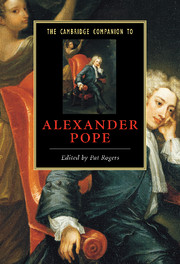Book contents
- Frontmatter
- Introduction
- 1 Pope, self, and world
- 2 Pope’s friends and enemies: fighting with shadows
- 3 Pope’s versification and voice
- 4 Poetic spaces
- 5 Pope’s Homer and his poetic career
- 6 Pope and the classics
- 7 Pope and the Elizabethans
- 8 Pope in Arcadia: pastoral and its dissolution
- 9 Pope and ideology
- 10 Pope and the poetry of opposition
- 11 Crime and punishment
- 12 Landscapes and estates
- 13 Money
- 14 Pope and the book trade
- 15 Pope and gender
- 16 Medicine and the body
- 17 Pope and the other
- Further reading
- Index
2 - Pope’s friends and enemies: fighting with shadows
Published online by Cambridge University Press: 28 April 2008
- Frontmatter
- Introduction
- 1 Pope, self, and world
- 2 Pope’s friends and enemies: fighting with shadows
- 3 Pope’s versification and voice
- 4 Poetic spaces
- 5 Pope’s Homer and his poetic career
- 6 Pope and the classics
- 7 Pope and the Elizabethans
- 8 Pope in Arcadia: pastoral and its dissolution
- 9 Pope and ideology
- 10 Pope and the poetry of opposition
- 11 Crime and punishment
- 12 Landscapes and estates
- 13 Money
- 14 Pope and the book trade
- 15 Pope and gender
- 16 Medicine and the body
- 17 Pope and the other
- Further reading
- Index
Summary
Pope never found it difficult to identify the moral values he defended: “To virtue only and her friends, a friend”, he proclaimed in the first of his Imitations of Horace (TE, iv, p. 17), making the claim specific and only the application general. Where others wrestled with the semantics of a precise meaning, Pope had a startling simplicity. “Ask you what Provocation I have had? | The strong Antipathy of Good to Bad” (TE, iv, p. 324). His desire to claim a similar authority for his friendships made explicit a tendency enunciated by Swift:
I have often endeavoured to establish a Friendship among all Men of Genius, and would fain have it done. They are seldom above three or four Contemporaries and, if they could be united, would drive the world before them.
(Corr, ii, p. 199)For Pope the desire to establish around himself a circle of virtuous men, to correspond with constantly, became a vital element in his desire to fix forever the image of his life as a virtuous crusade. In his villa at Twickenham everything, from the motto Libertati & Amicitiae over the door to the placing of ornaments in the grotto, was designed to give his moral sentiments an outward and visible form. From the first Pope's versifying abilities were accompanied by a desire to establish friendships less with contemporaries than with men who, though advanced in years and decayed in style, could prove helpful to an aspiring poet.
- Type
- Chapter
- Information
- The Cambridge Companion to Alexander Pope , pp. 25 - 36Publisher: Cambridge University PressPrint publication year: 2007
- 1
- Cited by

